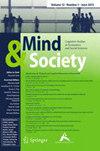Hindi Adaptation and validation of Body Image Concern Inventory
Q1 Arts and Humanities
引用次数: 0
Abstract
The present study aimed to adapt Body Image Concern Inventory (BICI) into Hindi language and assess the psychometric properties of the scale in Hindi speaking population. This scale was originally developed by Littleton, Axson and Pure in 2005. World Health Organization guideline of translation and adaptation of scale has been followed to translate this scale into Hindi. After the completion of translation process, the Hindi version of BICI, Body Dissatisfaction Scale, Rosenberg’s Self-esteem Scale, and General Mental Health Questionnaire-28 has been administered to the sample. The age range of participants was 15-25years (76 male and 81 female). In the end, the factor structure and psychometric properties of the scale were evaluated. The exploratory factor analysis identified two factors. First factor consists of 12 item that are labelled “symptom interference” and the second factor consists of 7 items labelled as “dysmorphic symptoms”. The reliability of the subscales as well as full scale was found satisfactory (For symptom Interference r=.828, for Dysmorphic symptoms r=.789, for full scale r=.871). The concurrent validity of the scale ranged from .38 to .42. Comprehensively, the finding suggest that the Hindi version of BICI is a reliable and valid tool and might useful for research purposes as well as for assessing appearance concerns in Hindi-speaking zones. Keywords: Body image concern inventory, Hindi adaptation, Psychometric properties, Factor Structure身体形象关注量表的印地语改编与验证
本研究旨在将身体形象关注量表(BICI)引入印地语,并评估该量表在印地语人群中的心理测量特性。这个量表最初是由Littleton, Axson和Pure在2005年开发的。按照世界卫生组织翻译和调整量表的准则,将该量表翻译成印地语。翻译完成后,对被试进行印地语BICI量表、身体不满意量表、Rosenberg自尊量表和一般心理健康问卷-28。参与者年龄在15-25岁之间(男性76人,女性81人)。最后,对量表的因子结构和心理测量特性进行了评价。探索性因子分析确定了两个因素。第一个因素由12个项目组成,标记为“症状干扰”,第二个因素由7个项目组成,标记为“畸形症状”。子量表和全量表的信度令人满意(对于症状干扰r=。828,对于畸形症状r=。789,满量程r= 0.871)。量表的并发效度为0.38 ~ 0.42。总的来说,这一发现表明,印地语版的BICI是一个可靠而有效的工具,可能对研究目的有用,也可能对评估印地语地区的外貌问题有用。关键词:身体意象关注量表,印地语适应,心理测量特征,因素结构
本文章由计算机程序翻译,如有差异,请以英文原文为准。
求助全文
约1分钟内获得全文
求助全文
来源期刊

Mind and Society
Arts and Humanities-Philosophy
CiteScore
2.30
自引率
0.00%
发文量
5
期刊介绍:
Mind & Society is a journal for ideas, explorations, investigations and discussions on the interaction between the human mind and the societal environments. Scholars from all fields of inquiry who entertain and examine various aspects of these interactions are warmly invited to submit their work. The journal welcomes case studies, theoretical analysis and modeling, data analysis and reports (quantitative and qualitative) that can offer insight into existing frameworks or offer views and reason for the promise of new directions for the study of interaction between the mind and the society. The potential contributors are particularly encouraged to carefully consider the impact of their work on societal functions in private and public sectors, and to dedicate part of their discussion to an explicit clarification of such, existing or potential, implications.Officially cited as: Mind Soc
 求助内容:
求助内容: 应助结果提醒方式:
应助结果提醒方式:


